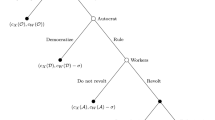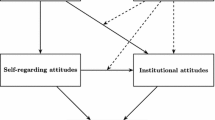Abstract
Across countries, education and democracy are highly correlated. We motivate empirically and then model a causal mechanism explaining this correlation. In our model, schooling teaches people to interact with others and raises the benefits of civic participation, including voting and organizing. In the battle between democracy and dictatorship, democracy has a wide potential base of support but offers weak incentives to its defenders. Dictatorship provides stronger incentives to a narrower base. As education raises the benefits of civic engagement, it raises participation in support of a broad-based regime (democracy) relative to that in support of a narrow-based regime (dictatorship). This increases the likelihood of successful democratic revolutions against dictatorships, and reduces that of successful anti-democratic coups.
Similar content being viewed by others
References
Acemoglu D., Johnson S., Robinson J., Yared P. (2005). From education to democracy. American Economic Review Papers and Proceedings, 95, 44–49
Almond, G., & Verba, S. (1989, 1st ed. 1963). The civic culture: Political attitudes and democracy in five nations. London: Sage Publications.
Arellano M., Bond S. (1991). Some tests of specification for panel data: Monte Carlo evidence and an application to employment equations. The Review of Economic Studies, 58, 277–297
Barro R. (1997). Determinants of economic growth. Cambridge, MA, MIT Press
Barro R. (1999). Determinants of democracy. Journal of Political Economy, 107, 158–183
Barro R., Lee J.-W. (2001). International data on educational attainment: Updates and implications. Oxford Economic Papers, 53, 541–563
Blundell R., Bond S. (1998). Initial conditions and moment restrictions in dynamic panel data models. Journal of Econometrics, 87, 115–143
Bobba, M., & Coviello, D. (2006). Weak instruments and weak identification in estimating the effects of education on democracy. Economics Letters (forthcoming).
Boix C., Stokes S. (2003), Endogenous democratization. World Politics, 55, 517–549
Bourguignon F., Verdier T. (2000). Oligarchy, democracy, inequality, and growth. Journal of Development Economics, 62, 285–313
Bowles S., Gintis H. (1976). Schooling in capitalist America: Educational reform and the contradictions of capitalist life. New York, Basic Books
Brady H., Verba S., Schlozman K.L. (1995). Beyond SES: A resource model of political participation. American Political Science Review, 89, 271–294
Campante F., Do Q.-A. (2005). Inequality, redistribution, and population. Mimeo, Harvard University
Castello-Climent, A. (2006). On the distribution of education and democracy. Working Paper 0602, Institute of International Economics, University of Valencia.
Cooper R., John A. (1988). Coordinating coordination failures in Keynesian models. Quarterly Journal of Economics, 103, 441–465
Costa D., Kahn M. (2003). Cowards and heroes: Group loyalty in the American civil war. Quarterly Journal of Economics, 118, 519–548
Dee T. (2004). Are there civic returns to education?. Journal of Public Economics, 88, 1697–1720
De Long B., Shleifer A. (1993). Princes and merchants: European city growth before the industrial revolution. Journal of Law and Economics, 36, 671–702
DiPasquale D., Glaeser E. (1999). Incentive and social capital: Are homeowners better citizens?. Journal of Urban Economics, 45, 354–384
Driscoll A., Nagel N. (2005). Early childhood education birth to 8: The world of children, families and educators (3rd ed). Boston, Pearson Education
Ferguson N. (1999). The pity of war. New York, Basic Books
Finer S. (1988). The man on horseback: The role of the military in politics. Boulder, Colorado, Westview Press
Glaeser E., LaPorta R., Lopez-de-Silanes F., Shleifer A. (2004). Do institutions cause growth?. Journal of Economic Growth, 9, 271–303
Glaeser, E., & Sacerdote, B. (2001). Education and religion, NBER Working Paper.
Gordon A., Browne K. (2004). Beginnings and beyond: Foundations in early childhood education (6th ed). Clifton Park, NY, Thomson Delmar Learning
Gradstein M., Justman M. (2002). Education, social cohesion, and economic growth. American Economic Review, 92, 1192–1204
Hanson V. (2001). Carnage and Culture: Landmark battles in the rise of Western power. New York, Doubleday
Helliwell, J., & Putnam, R. (2007). Education and social capital. Eastern Economics Journal (forthcoming).
Holmes B. (1979). International guide to education systems. Paris, UNESCO
Huntington S. (1957). The soldier and the state: The theory and politics of civil–military relations. Cambridge, Massachusetts, Harvard University Press
Huntington S. (1991). The third wave: Democratization in the late twentieth century. Norman, OK, University of Oklahoma Press
Jaggers K., Marshall M. (2003). Polity IV project. Center for International Development and Conflict Management, University of Maryland
Kamens D. (1988). Education and democracy: A comparative institutional analysis. Sociology of Education, 61, 114–127
Keegan J. (1976). The face of battle. New York, Viking Press
Lipset S.M. (1959). Some social requisites for democracy: Economic development and political legitimacy. American Political Science Review, 53, 69–105
Lipset S.M. (1960). Political man: The social basis of modern politics. New York, Doubleday
Milligan K., Moretti E., Oreopoulous P. (2004). Does education improve citizenship? Evidence from the US and the UK. Journal of Public Economics, 88, 1667–1695
Mulligan C., Gil R., Sala-i-Martin X. (2004). Do democracies have different public policies than non-democracies?. Journal of Economic Perspectives, 18, 51–74
Mulligan C., Shleifer A. (2005). The extent of the market and the supply of regulation. Quarterly Journal of Economics, 120, 1445–1473
Olson M. (1965). The logic of collective action: Public goods and the theory of groups. Cambridge, Massachusetts, Harvard University Press
Papaioannou E., Siourounis G. (2005). Economic and social factors driving the third wave of democratization. Mimeo, London Business School
Przeworski A., Limongi F. (1993). Political regimes and economic growth. Journal of Economic Perspectives, 7, 51–70
Przeworski A., Alvarez M., Cheibub J., Limongi F. (2000). Democracy and development: Political institutions and well-being in the world, 1950–1990. Cambridge, Cambridge University Press
Rander-Pehrson J.D. (1999). Germany and the revolution of 1848–1849. New York, Peter Lang
Author information
Authors and Affiliations
Rights and permissions
About this article
Cite this article
Glaeser, E.L., Ponzetto, G.A.M. & Shleifer, A. Why does democracy need education?. J Econ Growth 12, 77–99 (2007). https://doi.org/10.1007/s10887-007-9015-1
Published:
Issue Date:
DOI: https://doi.org/10.1007/s10887-007-9015-1




